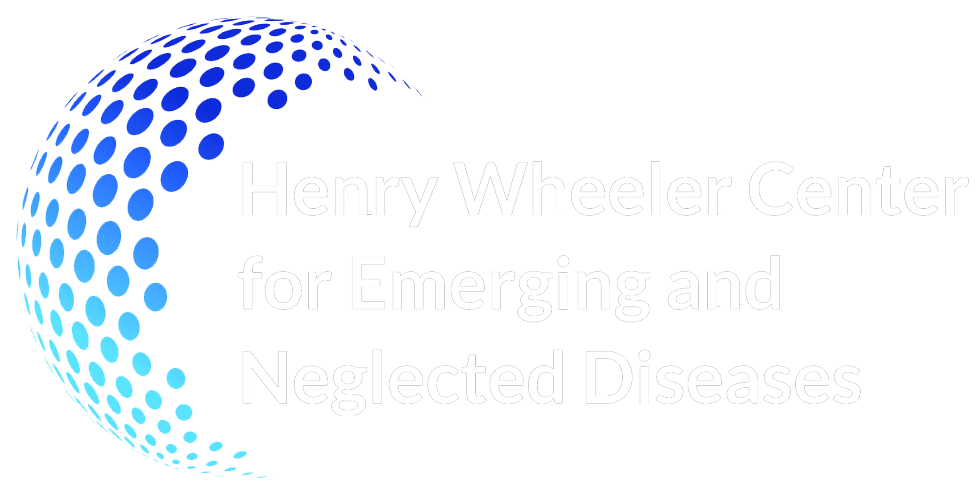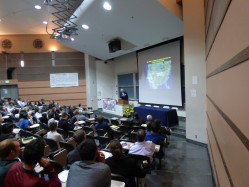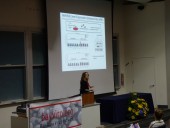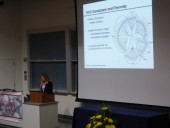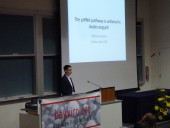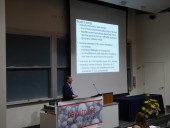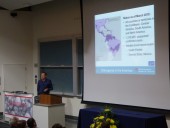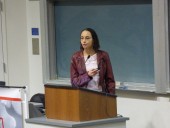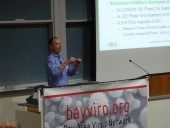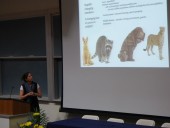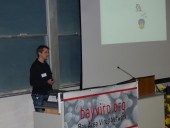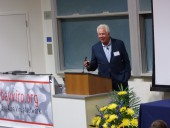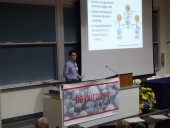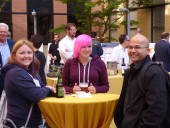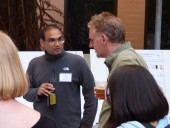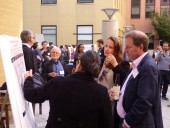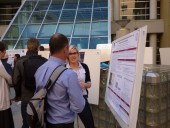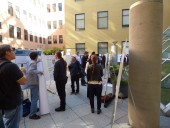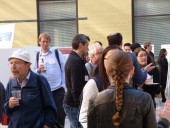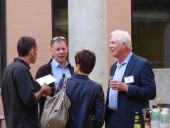5th Annual Bayviro Symposium Brings Together Bay Area Virology Community
The Annual Bay Area Symposium on Viruses was held on Friday, May 29th in the Chan Shun Auditorium on UC Berkeley’s main campus. This was the 5th year of the symposium, which brought together approximately 300 members of the Bay Area virology community for a series of scientific talks by faculty, industry representatives, post-docs, and students, as well as a poster session and networking opportunities.
The morning session featured talks from UC Berkeley and Stanford, as well as Gilead Sciences and the Blood Systems Research Institute (BSRI), located in San Francisco. Professor Britt Glaunsinger, a virologist in UC Berkeley’s Plant and Molecular Biology Department and a recently elected investigator of the Howard Hughes Medical Institute presented her group’s recent research effort into mammalian genome components called short interspersed nuclear elements, or SINEs, which become activated during viral infections. Utilizing novel methods, Dr. Glaunsinger and colleagues discovered which of these SINEs and nearby genes are transcriptionally activated in infected cells, and elucidated their activities, including modifying both host and viral gene expression. Professor Jeffery Glenn, a virologist at Stanford University School of Medicine’s Department of Microbiology and Immunology, described recent advances in the development of novel antivirals against hepatitis delta virus (HDV), an infection that strikes over 15 million worldwide, often in combination with hepatitis B infection (HBV), causing serious liver damage and often leading to cancer. A key aspect of the approach is the targeting of a host rather than viral protein, presenting a new approach which could minimize the development of resistance. Clinical results from a recently completed Phase 2a study were presented that showed promising results in reducing HDV levels in patients.
Dr. Hadas Dvory-Sobol, a research scientist at Gilead and a former member of Dr. Glenn’s research group, presented details on the nature of potential resistance mutations of hepatitis C virus (HCV) that emerge to sofosbuvir (Sovaldi) and the sofosbuvir/ledipasvir combination (Harvoni), new agents for the treatment and cure of this once chronic viral infection. Based on clinical results, emergence of resistance was rare amongst patients treated with these regimens, and had a minimal impact on viral clearance. Graham Simmons, an investigator at BSRI, turned the focus to emerging viruses, namely Chikungunya, a mosquito-borne viral infection currently sweeping through the Caribbean and Latin America. Dr. Simmons presented data from blood donors in Puerto Rico which suggest the epidemic is much more widespread there than has been reported through case reports. He also described the characterization of antibodies to the virus isolated from the blood of exposed donors and that are able to control virus replication in animal models.
The afternoon session featured talks from UC Davis and the Gladstone Institute for Virology and Immunology at UC San Francisco, as well as South San Francisco based biotech Alios Biopharma. Dr. Patricia Pesavento, a veterinary professor in UC Davis’s Vet School’s Department of Pathology, Microbiology, and Immunology, presented her research into a polyomavirus associated with an ongoing outbreak in raccoons in California. The virus is associated with and may cause brain tumors in these animals, and presents a model that could provide insights into polyomavirus associated oncogenesis in humans. Dr. Andreas Jeckle, principal scientist at Alios Biopharma, described his team’s research into novel inhibitors of human rhinovirus (HRV), the cause of the common cold, but also life-threatening acute exacerbations of respiratory conditions such as asthma. A promising lead, AL-036, was presented, which inhibits viral polymerase, and has shown promising efficacy in animal models against a broad spectrum of HRV types and other related viruses. Dr. Warner Greene, the director of the Gladstone Institutes, presented the groundbreaking research of his group into the mechanism of CD4 T cell death during HIV infection. Dr. Greene and colleagues have observed that most CD4 cells die not as a result of HIV infection itself, but rather from an innate immune response to the presence of HIV’s nucleic acids in the cell. This “suicide” process seems to create a vicious cycle, generating an inflammatory response and leading to further T cell death within the lymph nodes. These insight open potential new pathways into HIV drug discovery, namely those that target the host rather than the virus.
The symposium also featured competitively selected short talks from graduate students Mark Kunitomi of Raul Andino’s lab at UCSF, and Trever Greene from Laurent Coscoy’s lab at UC Berkeley, as well as post-docs Alexey Petrov and Desyree Jesus of Jody Puglisi’s lab at Stanford and Laura Hertel’s lab at the Children’s Hospital Research Institute, respectively. In addition, a lunchtime panel was held that focused on the 2014-2015 Ebola virus outbreak in West Africa. Speakers included UCSF graduate Jana Broadhurst and Stanford physician Dana Clutter, both of whom served in Sierra Leone last year treating affected patients. Dr. Broadhurst shared her experiences with establishing specimen management and diagnostic tools, which proved critical in managing the epidemic and ultimately bringing it under control. She was joined by Dr. David Persing, the Chief Medical and Technology Officer at Cepheid, who described the efforts of his company to bring an Ebola diagnostic forward during the crisis. Art Reingold, a professor of epidemiology at UC Berkeley’s School of Public Health, provided perspective on the current state of the outbreak, the nature of the global response, and how things might be improved for the future.
The symposium served as a nucleating event for the Bay Area Virus Network, or Bayviro, a constellation of scientists, engineers, and clinician researchers in and around the San Francisco bay who are working on virology, host-pathogen interactions, and control of human an animal virus infections. The group’s website, Bayviro.org, serves as an online resource, forum, and platform for connecting investigators at universities, companies, and research institutes throughout the region.
